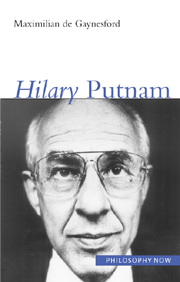5 - Core issues
from Part II - Character
Summary
When we examine what we should say when, what words we should use in what situations, we are looking not merely at words (or “meanings”, whatever they may be) but also at the realities we use the words to talk about: we are using a sharpened awareness of words to sharpen our perception of, though not as the final arbiter of, the phenomena.
J. L. Austin, A Plea for Excuses (1979: 182)Realism, rationality and meaning are three basic issues on which, as he himself acknowledged, Putnam was most deeply influenced by the philosophical context in which he found himself. Having examined these structural influences, we are now in a position to appreciate two even more fundamental sources of inspiration and stimulus: ideas concerning the core topics of intentionality and a function-based approach.
Intentionality
Putnam's overall concerns in the first part of his career, no less than the second, are expressed by the quoted passage from John Austin (1911–60). How must we and the world be, and how must we be connected up with the world, if we are to perceive it, think about it, talk about it? And in particular, what should we make of the concepts and words we have at our disposal for thinking and talking about the world – what are the “arbiters” here, and how do they operate?
It may seem immediately surprising to draw this connection with Austin, who was on the face of it a very different kind of philosopher from Putnam.
- Type
- Chapter
- Information
- Hilary Putnam , pp. 45 - 56Publisher: Acumen PublishingPrint publication year: 2006



